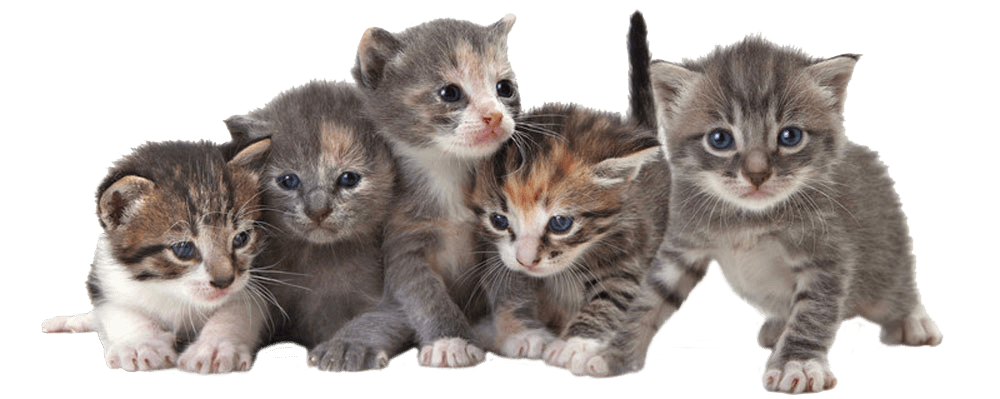We know keeping your cat healthy is very important to you and your family. We provided a variety of topics about kitten and cat health for you to read.

A Kitten’s New Home
By selecting a kitten as your pet, you have chosen an extremely clean pet that usually needs little house training. Your kitten is likely to require little care but provide excellent companionship. He will, however, demand that his love and loyalty be earned.
Cats must have regular meals, clean litter, grooming, and attention in the form of play. Your pet will be quite content to live his entire life indoors provided that you offer companionship.
Male or female, kittens and cats are affectionate, intelligent, and playful. However, unless you plan to breed your cat, neutering is recommended to keep males from spraying, and females from producing unwanted litters. Sterilization will also prevent a multitude of medical problems. Sterilization should be performed at 4-7 months of age.
Needed supplies for a new kitten include high quality food, bowl for water and food, a litter pan with litter and scoop, grooming tools, a pet carrier, and of course, toys.
Read more about a kitten’s new home.
Read more about a kitten’s behavior.
Read more about kitten nutrition.
Helpful Hints for Feeding Your Cat
- Feed a diet that is 100% complete and balanced for your pet’s particular life stage: pediatric, adulthood, and senior cat.
- Provide plenty of fresh drinking water for your cat at all times.
- Don’t substitute milk for water, or milk for a meal of solid food.
- Do not feed your pet table scraps.
- Don’t feed your cat raw fish.
- Don’t feed your cat any food that may contain small sharp bones (such as chicken bones). These bones may splinter and cause choking or digestive problems.
- Don’t feed your pet raw meats because of the possibility of parasitic or bacterial infections.
- Don’t feed your cat raw eggs.
- We carry a variety of high quality vitamin supplements to help insure a long healthy life for your pet.
Read more about nutrition for cats.
Ringworm
- Ringworm is caused by a microscopic fungal organism called a dermatophyte.
- Ringworm is spread by direct contact with an infected animal (or person), or with infected bedding and grooming tools.
- Ringworm is a zoonotic disease. The fungal organisms that cause ringworm are very contagious and can be spread from pet to pet, pet to human, or human to pet.
- Early signs of infection include dry, flaky skin, broken hair, and bald patches on ears, front legs and around the eyes. More advanced signs include crusty lesions and infected areas that become red and sore.
- Many cats do not show clinical signs of ringworm but are carriers.
- There is no worm involved. Healing of the infected areas occurs from the center out, creating a ring effect, thus the name “ringworm”.
- Ringworm is most common in young cats, and in cats with debilitating diseases.
Heartworm Disease in Cats
Cats get heartworms too! All cats should be protected from heartworm disease. Cats contract heartworm disease in the same way that dogs do. Mosquitos transmit the disease by biting an already infected animal, and then pass the infection on to other animals they bite.
Signs of heartworm disease are not usually seen until very late in the disease process. Coughing, breathing difficulties, vomiting, and weight loss may be observed, but often times the cat will suffer in silence with no signs of this serious illness.
Aggressive treatment of the infection has a high chance of serious complications, including death. There is no good solution once the cat is infected with heartworms. Without treatment, the risks of lung damage is high and death is not uncommon. We treat infected cats with long-term preventatives to decrease the number of worms and minimize symptoms.
The only solution to this dangerous disease is to prevent it. We have preventatives that are very effective and easy to use. No cat should have to suffer with this easily preventable disease.
Elimination Problems
One in every 10 cats will have a litter box lapse in his or her lifetime. Many of the most common reasons are listed below:
- The cat is suffering from a medical problem involving the urinary tract.
- The cat experiences a bout of geriatric constipation.
- The caretaker does not keep the litter box as clean as the cat wants it to be.
- The owner changes the brand or type of litter. (esp. deodorized or perfumed litter)
- The owner changes the location of the litter box.
- The owner buys a new box and throws out the old one.
- The owner cleans the litter box with too harsh a cleaning product.
- The location of the litter box is too busy or not private enough for the cat.
- The home is too large for just one litter box.
- The cat inadvertently gets locked out of reach of the litter box.
- The cat is kept from using the litter box by another animal in the house.
- There are too many cats and not enough territory.
- There are too many cats and not enough litter boxes.
- Stray cats can be seen/smelled near the cat’s territory.
- The unneutered male cat has come of age and is marking his territory.
- The unspayed female is in heat and advertising for suitors.
- Over time, the cat has developed an aversion to the texture of the litter.
- The cat was never properly trained to use the litter box in the first place.
- The cat is stressed by a change in routine or environment, including a new baby, new furniture, work schedule changes, vacations, overnight guests, or a move.
Dental Hygiene for Cats
Most dental problems are serious enough to be seen by a veterinarian, (and almost all teeth lost), are the result of periodontal disease. This is by far the most common cause of “bad breath”, and affects 80- 85% of dogs and cats over the age of 3. In advanced cases, periodontal disease results in infected, foul-smelling, loosened teeth; with massive, unsightly accumulation of tartar. This can be a painful disease that may even cause signs such as drooling, diarrhea, vomiting and irritability.
Read more about dental hygiene for cats.
Adult Cat Health
Wellness exams are vital to a senior cats health. We have put together general recommendations for you to review and print.
